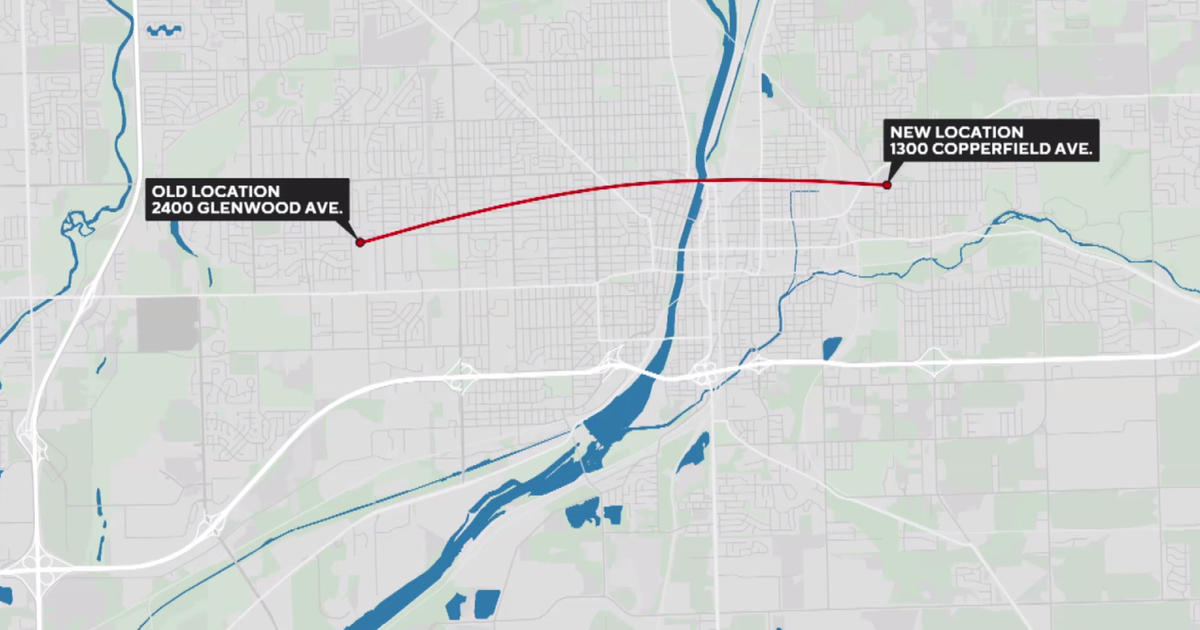Tech Tour Day Six: Grand Rapids = Grand Tech Startups
(Note: For full coverage of the 2013 Spring Tech Tour, visit this link.)
GRAND RAPIDS (WWJ) -- Grand Rapids, capital of West Michigan, is big enough to have lots of big, longtime tech companies rivaling anything in metro Detroit. So hi, Trivalent! Howdy, Open Systems Technologies! You guys are great, but this time I wanted new faces.
So I asked Tim Mroz at the economic development agency The Right Place Inc. to find me some startups. And he found me some great ones.
My day started in Kentwood near Gerald R. Ford Airport with Worx Displays, the brain child of a 2011 Michigan State University pre-law graduate, Annu Deol.
A native of Australia who moved to the Grand Rapids area when she was 10, Deol said she learned about LEDs her senior year in college and got completely fascinated.
"I just started doing a lot of research and saw the opportunity and loved the technology," Deol said. She started in business unofficially last year and incorporated Worx Displays in January of this year. Her own savings, friends and family, and a chance meeting with Nico Nicoletti, CEO of a packaging machinery company, IMS Group USA, have financed the company thus far. Nicoletti is also a 25-year veteran of the import and export trade who helps Deol deal with raw materials that have to be imported.
Worx currently has displays at Monnelli's Restaurant in Byron Center, at Lady Jane's Haircuts for Men on Rochester Road in Troy, and for Wyoming doctor Gursharn S. Dosanjh at 36th St. and US-131.
Worx provides LED display technology, service, support, installation, software and hardware, and Deol's office has magnificent display units that can give designers all sorts of cool ideas.
Looking ahead, Deol says she's looking at partnerships with Grand Rapids-based Freshwater DMP, a digital signage consultant for Sam's Club, Wal-Mart and Meijer, and with Immersive Labs of New York, a company founded by Holland native Jason Sosa.
More at www.worxdisplays.com.
----------------------------------------
I confess I've written about our next company already, but it still counts as a startup -- less than five employees, virtual offices.
Conpoto is a service that allows you to treat others to drinks or food at restaurants that have signed up with the service.
Merchants like it because they don't have to discount the merchandise (unless they want to). Users like it because it's a unique way to say "thank you" or "attaboy" beyond cash (crass) and flowers (which can send the wrong message).
Consumers pay for the gift when they give it. Business givers don't have to pay until the gift is redeemed.
Conpoto is the brain child of Matt Lepard, an Albion College graduate in economics and management whose business career started at auto supplier Prince Corp., and who later worked for a small conglomerate of manufacturing businesses called Pi Optima. He started Conpoto in 2011 as a pilot project.
"I had someone write the code, a very simple Web based consumer-to-consumer platform where I could just send you a treat," Lepard said. "It was very simple -- rudimentary, in fact -- it had no mobile component, but I wanted to see if the concept worked, and it did. We went for 12 or 15 months as a pilot and learned a lot about what worked and what didn't."
In Lepard's eyes, Conpoto became a "real" company when Matt Hearn and Andy Bass, executive and cofounder respectively of Holland-based Lean Logistics (another company the Tech Tour has visited in the past) joined up.
"They came to Conpoto late last fall, and that's when we introduced mobile," Lepard said.
Since then, Conpoto has signed up about 50 merchants who offer drinks and eats, and about 100 businesses who use the program to reward employees and customers.
"A lot of people offer social gifting, but what we are doing different is letting businesses use it for client and employee recognition," Lepard said. "We're getting realtors on board, mortgage companies."
One mortgage company, Lepard said, sent out 800 coffee gifts to potential customers, saying "hey, rates are at an all-time low, I'd love to sit down and talk with you about it over coffee." About 200 of the coffee gifts got redeemed -- and the campaign generated about $14,000 in mortgage closing costs out of $400 in coffee gifts.
Conpoto has also signed deals with the Lansing and Grand Rapids chambers of commerce, allowing the chambers to gift to member merchants. Conpoto's revenue comes from a small piece of transactions that happen out of those deals. Conpoto also offers its business customers a full reporting and analytics suite.
Lepard said Conpoto is about to close a venture capital financing, and "almost all of it is local."
More at www.conpoto.com.
--------------------------------------------------------
My third startup was Ryan Vaughn, founder of Varsity News Network, founded a little over two years ago.
Vaughn is a Grand Haven native who got a degree in creative writing from Western Michigan University, worked a while in Internet marketing at a car dealership, then got a master's degree in communications from Grand Valley State University. He started VNN while still a student at Grand Valley.
The idea behind Varsity News Network is to allow high schools to pump up public perception and enthusiasm by pumping up their success in sports -- and not just big-name sports like football and basketball (indeed, perhaps especially not those big-name sports).
"I grew up in Grand Haven, and when I was in high school we won the district championship in basketball," Vaughn said. "The crowd rushed the court because Grand Haven never wins the district championship. My family rushed the court and my mom jumped into my arms. The next day I ran to the mailbox to check the paper, and as it turned out some photographer snapped a picture of me hugging my mom and it was the entire front page of the paper. So my mom laminated it, framed it, and sticks it in the living room."
The idea of Varsity News Network is to bring that kind of community excitement and exposure to every school's sports successes.
Vaughn said not every school excels at the big-name sports, but "almost all schools will have one, maybe two competitive sports. What I can do is promote awareness of those sports that are not basketball and football. Varsity News Network puts the tools in the hands of schools so they can promote every sport to the same degree and still make the revenue work. We sell a Web platform to high schools, a suite of Internet services, that allows them to promote their athletics. It serves as the official Web site for the school's athletic department. They can sell advertising, sell events, sell spirit gear."
Varsity News Network also sells advertising on the site, and the schools get a portion of that revenue. Varsity News Network also gains revenue by taking a small percentage of ticket and spirit gear sales generated by the school's Web site.
"The goal is to make the Web site profitable to the school in less than a year through increased sales of tickets and spirit gear," Vaughn said.
In a schools-of-choice era, Vaughn said studies show that having a successful and highly visible athletic program is one of the major factors in parents and students choosing a school, "and that's true even if the student in question is not an athlete." The idea of Varsity News Network is to give every school a chance to have that kind of athletic program -- even if its best sports happen to be swimming or track.
The company currently has 16 employees Its headquarters is in the Windquest building in Grand Rapids. It also has sales staff in other states where it does business, including Indiana, Ohio, Kentucky, Missouri and Washington.
More at http://varsitynewsnetwork.com/.
----------------------------------------------------------------
My last stop Wednesday was actually a Southfield business that's expanded into West Michigan.
In a nondescript light industrial building hard by US-131 in Byron Center south of Grand Rapids, 123.Net has built a big, robust, modern data center for its telecom and Internet service provider clients.
Two years ago, 123.Net bought a company called West Michigan Internet Services that owned the building. 123.Net sold off the residential side of the business, and since then has expanded the data center to 3,500 square feet out of a total of 6,000 square feet of space in the office. (123.Net also has first rights on another 16,000 square feet of space in the building, which houses everything from a storefront church to a windshield repair shop.)
Dave Curran, director of sales at 123.Net, said the Byron Center data center has two redundant power sources and a backup generator. Also, he said, "we own and operate the fiber network that goes in and out of all our facilities," with 10-gigabit connections to bulk connectivity providers Level 3 and Cogent in Southfield, Savvis in Virginia and Global Crossing and Comcast in Chicago.
"We're attracting managed service providers and Internet service provides and IT service companies that provide hosted services that don't want to build their own data centers," Curran said.
What 123.Net sells is simplicity itself -- a rack with power, insanely fast Internet and good physical security. What you put in it is up to you as a customer.
Curran agrees with his former employers at Online Technologies that cool-weather Michigan is a great place to build data centers. "We use cool air from outside in the winter," he said. "Michigan is a great place to colocate. The problem in the past has been the network connectivity. Now I think we're on a par with other major markets."
More at www.123.net.
---------------------------------------------------------------
And so ended a whirlwind visit to Grand Rapids. Thanks to Tim Mroz of Grand Rapids' economic development agency, The Right Place Inc., for finding me the startups! Next up: Kalamazoo, where we'll see how its heritage as both a center of the pharmaceutical industry (remember Upjohn? Kaopectate, anybody?) and univeristy town is translating into cool tech-based economic development. See you then!







